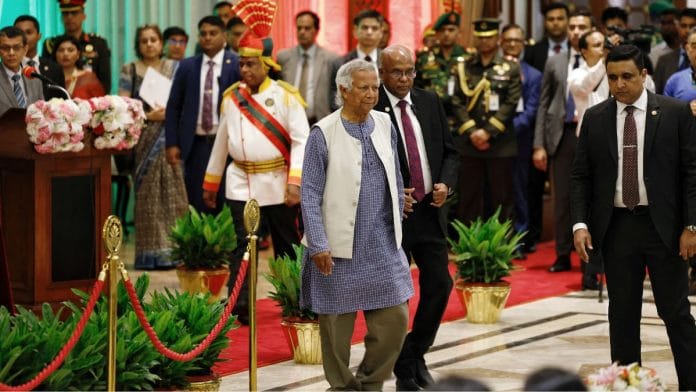New Delhi: India’s push for faster internet access in the Northeast has faced a setback with the Muhammad Yunus-led interim government reversing a decision by the former Sheikh Hasina administration permitting private telecom operators to use Bangladesh as a transit point for supplying bandwidth to the connectivity-challenged region.
This fresh move by the Yunus government is being viewed as one of several steps it is taking to undermine India’s interests while strengthening ties with Pakistan.
The proposal involved using the Akhaura border, between India and Bangladesh in Tripura, as a transit route from Singapore to connect the region with Southeast Asia via Bharti Airtel’s network.
India’s Northeast is connected to Singapore via submarine cables in Chennai using the domestic fibre optic network. Since the landing station in Chennai is about 5,500 km away from the Northeast, the internet speed is compromised.
Along with it, mountainous terrain of the northeast also makes maintenance of fibre optic networks and the installation of new networks difficult leading to prolonged blackouts in case of any issue.
Bangladesh’s decision to reverse the decision taken by the now-ousted Hasina government came just days before Indian Foreign Secretary Vikram Misri is slated to visit Dhaka Monday.
The Bangladesh Telecommunication Regulatory Commission (BTRC) claimed that the arrangement would undermine the country’s potential to become a regional internet hub and diminish its influence in the global data exchange network.
In February, Summit Communications Ltd. and Fiber@Home—two major telecom players in Bangladesh—had sought approval from the BTRC to channel bandwidth from Singapore to India’s northeastern states through Bangladesh.
The proposal involved using the Akhaura border as a transit route to connect the region with Southeast Asia via Bharti Airtel’s network.
However, BTRC Chairman Muhammad Emdad-Ul-Bari said this week that the commission had decided to withdraw the proposal after concerns were raised that such a move would strengthen India’s position as a regional internet hub while limiting Bangladesh’s ability to emerge as a critical player in global digital infrastructure.
The deal also threatened to disrupt Bangladesh’s ambitions to serve as a Point of Presence (PoP) for major global content delivery networks (CDNs) such as Meta, Google, and Amazon, local media reports stated.
Also read: ‘Out of Pakistan playbook’: Ahead of Misri’s Dhaka visit, rights forum calls out Bangladesh attacks
Political connections and controversies surrounding operators
The decision also comes amid ongoing scrutiny over political ties within Bangladesh’s telecom sector.
Summit Communications is led by Muhammad Farid Khan, the younger brother of Faruk Khan, a senior figure in the Awami League. Khan is also closely associated with Sajeeb Wazed Joy, the son of former Prime Minister Sheikh Hasina and ICT advisor, further raising questions about potential political influence in the sector.
In recent months, Summit has been at the center of controversy, including for a decision in September to waive a mandatory 5.5 percent fee on share transfers, which had been criticised for being politically motivated. The move sparked concerns that the company had received preferential treatment under the previous government, undermining transparency in regulatory practices.
Although the bandwidth transit deal could have brought foreign currency to Bangladesh by serving as a hub for internet traffic to India, critics argue it would ultimately have benefited Indian telecom providers more than Bangladesh.
“Ultimately, the bandwidth from India will end up in India, reducing Bangladesh to merely a transit point,” Aminul Hakim, president of the Bangladesh Internet Governance Forum, was quoted as saying by The Daily Star.
The state-run Bangladesh Submarine Cable PLC (BSCPLC), which controls a significant portion of the country’s international bandwidth capacity, has over 7,200 Gbps of unused bandwidth, raising further concerns that allowing private operators to facilitate transit would undercut BSC’s role in the country’s telecom infrastructure.
The regulatory reversal also follows growing scrutiny of Summit Communications, as Bangladesh’s Financial Intelligence Unit (BFIU) froze the bank accounts of several senior executives, including Farid Khan and his family members, in October this year. The accounts were frozen as part of an investigation into potential financial misconduct and money laundering. The move, which suspends all transactions for up to 30 days, signals an intensified government focus on telecom companies with political connections.
Indian foreign secretary’s visit amid diplomatic chill
The regulatory move coincides with Indian Foreign Secretary Vikram Misri’s visit to Bangladesh on 9 December for high-level consultations.
Misri is expected to meet his Bangladeshi counterpart and discuss bilateral issues, including regional security and trade relations. His visit comes at a time of diplomatic tension between the two countries, particularly regarding the safety of Hindus and other minorities in Bangladesh.
Earlier this week, tensions between Dhaka and New Delhi escalated after protesters breached the premises of Bangladesh’s Assistant High Commission in Agartala tearing down the Bangladeshi flag.
The incident led to the suspension of visa and consular services at the mission and the arrest of several protesters. In response, the Bangladesh government summoned the Indian High Commissioner to protest against the attack on its mission.
Also read: India & Bangladesh are in a media war. Journalists should be watchdogs, not warriors






